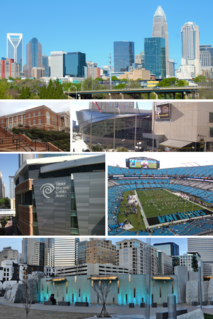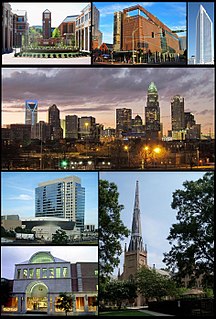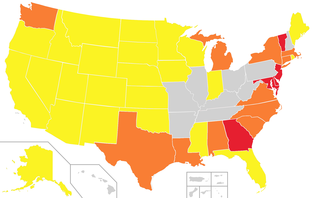Related Research Articles

The Tuscarora are a Native American tribe and First Nations band government of the Iroquoian family, with members today in New York, USA, and Ontario, Canada. They coalesced as a people around the Great Lakes, likely about the same time as the rise of the Five Nations of the historic Iroquois Confederacy, also Iroquoian-speaking and based then in present-day New York.

Charlotte is the most populous city in the U.S. state of North Carolina. Located in the Piedmont region, it is the county seat of Mecklenburg County. The population was 874,579 as of the 2020 census, making Charlotte the 16th-most populous city in the U.S., the seventh most populous city in the South, and the second most populous city in the Southeast behind Jacksonville, Florida. The city is the cultural, economic, and transportation center of the Charlotte metropolitan area, whose 2020 population of 2,660,329 ranked 23rd in the U.S. The Charlotte metropolitan area is part of a sixteen-county market region or combined statistical area with a 2020 census-estimated population of 2,846,550.

Mecklenburg County is a county located in the southwestern region of the state of North Carolina, in the United States. As of the 2020 census, the population was 1,115,482. Making it the second-most populous county in North Carolina and the first county in the Carolinas to surpass one million in population. Its county seat is Charlotte, the state's largest city.

Anson County is a county located in the U.S. state of North Carolina. As of the 2020 census, the population was 22,055. Its county seat is Wadesboro.
The Coharie ("Schohari"), which means "Driftwood" in Tuscarora, are a Native American tribe who descend from the Tuscarora nation and related peoples. Most survivors of this Iroquoian-speaking tribe left the colony after warfare in the early 18th century, under pressure from English colonists and Native American enemies. They migrated north to New York, where they colocated with other Iroquoian-speaking nations, and were accepted as the Sixth Nation of the Iroquois League. Leaders declared that the migration was complete by 1722, and those who stayed in the South were no longer considered Tuscarora.

The Lumbee Tribe of North Carolina is a state-recognized tribe in North Carolina numbering approximately 55,000 enrolled members, most of them living primarily in Robeson, Hoke, Cumberland and Scotland counties. The Lumbee Tribe is the largest state tribe in North Carolina, the largest state tribe east of the Mississippi River, and the ninth largest non-federally recognized tribe in the United States. The Lumbee take their name from the Lumbee River, which winds through Robeson County. Pembroke, North Carolina, is the economic, cultural and political center of the tribe.
The Guilford Native American Association (GNAA) is a Native American community association in Guilford County, North Carolina. It is a North Carolina State-recognized American Indian Organization, and is a United Way referral agency.

State-recognized tribes in the United States are organizations that identify as Native American tribes or heritage groups that do not meet the criteria for federally recognized Indian tribes but have been recognized by a process established under assorted state government laws for varying purposes. State recognition does not dictate whether or not they are recognized as Native American tribes by continually existing tribal nations.
The Haliwa-Saponi Indian Tribe, also the Haliwa-Saponi Tribe, is a state-recognized tribe and nonprofit organization in North Carolina. They are not a federally recognized as a Native American tribe and have never petitioned for federal recognition.
Demographics of North Carolina covers the varieties of ethnic groups who reside in North Carolina and relevant trends.

The Charlotte metropolitan area or Metrolina is a metropolitan area of North and South Carolina within and surrounding the city of Charlotte. The metropolitan area also includes the cities of Gastonia, Concord, Huntersville, and Rock Hill as well as the large suburban area in the counties surrounding Mecklenburg County, which is at the center of the metro area. Located in the Piedmont, it is the largest metropolitan area in the Carolinas, and the fourth largest in the Southeastern United States. The Charlotte metropolitan area is one of the fastest growing metropolitan areas in the United States.
Metrolina is the metropolitan area within and surrounding the city of Charlotte, North Carolina.
The following is a timeline of the history of Charlotte, North Carolina, United States.
The American Indian Center (AIC) of Chicago is the oldest urban American Indian center in the United States. It provides social services, youth and senior programs, cultural learning, and meeting opportunities for Native-American peoples. For many years, it was located Uptown and is now in the Albany Park, Chicago community area.
The history of Native Americans in Baltimore and what is now Baltimore dates back at least 12,000 years. As of 2014, Baltimore is home to a small Native American population, centered in East Baltimore. The majority of Native Americans now living in Baltimore belong to the Lumbee, Piscataway, and Cherokee nations. The Piscataway people are indigenous to Southern Maryland, living in the area for centuries prior to European colonization, and are recognized as a tribe by the state of Maryland. The Lumbee and Cherokee are indigenous to North Carolina and neighboring states of the Southeastern United States. Many of the Lumbee and Cherokee migrated to Baltimore during the mid-20th century along with other migrants from the Southern United States, such as African-Americans and white Appalachians.
The Lumbee Regional Development Association (LRDA) is a non-profit corporation, chartered by the State of North Carolina in 1968, organized to analyze and develop solutions for the health, educational, economic, and general welfare problems of rural and urban Indians in and around Robeson County. Its effective domain includes, but is not limited to, the Counties of Robeson, Hoke, Scotland, and Bladen, i.e., North Carolina’s Planning Region N. Federally funded programs are currently administered by the Lumbee citizens of these neighboring counties, from the LRDA offices in Pembroke, North Carolina. LRDA currently serves over 20,600 people each year. In July 2009, it had 62 full-time employees.

Patricia Ann McGee (Yavapai-Hualapai) was a Native American tribal leader who served as president of the Yavapai-Prescott Tribe. An effective advocate for her tribe, she garnered millions of dollars in federal and state funds to improve the infrastructure on the Yavapai reservation. She negotiated a water settlement agreement between the federal government and the tribe and established the first gaming license for any Indian tribe in Arizona. She helped develop a community center which earned a federal design award and served as an educational center to preserve both the culture and language of the Yavapai. In 2006, McGee was nominated by Supreme Court Justice Sandra Day O'Connor and inducted into the Arizona Women's Hall of Fame.
The Metrolina Library Association exists to connect and sharpen Charlotte, North Carolina area library professionals. The MLA was established in 1969 and continues to be active in the Charlotte community. It is open to anyone affiliated with or interested in libraries in the twelve county "metrolina" area of Cabarrus, Catawba, Cleveland, Gaston, Iredell, Lincoln, Mecklenburg, Rowan, Stanly and Union counties in North Carolina and York and Lancaster counties in South Carolina.
References
- ↑ "Tribes and Organizations". North Carolina Commission of Indian Affairs. Retrieved 2010-09-15.
- ↑ "North Carolina American Indian History Time Line". North Carolina Museum of History. Retrieved 2007-05-25.
- ↑ "History". Metrolina Native American Association. Retrieved 2010-09-15.
- ↑ "MNAA Website".